Related Research Articles

Schuyler Colfax was an American journalist, businessman, and politician who served as the 17th vice president of the United States from 1869 to 1873, and prior to that as the 25th speaker of the House of Representatives from 1863 to 1869. Originally a Whig, then part of the short-lived People's Party of Indiana, and later a Republican, he was the U.S. Representative for Indiana's 9th congressional district from 1855 to 1869.

Edmund Winston Pettus was a lawyer and politician who represented Alabama in the United States Senate from 1897 to 1907. He served as a senior officer of the Confederate States Army, commanding infantry in the Western Theater of the American Civil War. After the war, he was politically active in the Ku Klux Klan, a domestic terrorist, racist and antisemitic organization, serving as a Grand Dragon.
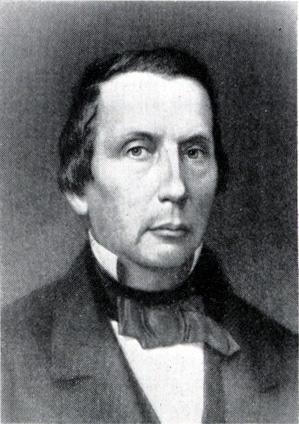
David Lowry Swain was the 26th governor of the U.S. state of North Carolina, from 1832 to 1835.

The Solid South or the Southern bloc was the electoral voting bloc of the states of the Southern United States for issues that were regarded as particularly important to the interests of Democrats in those states. The Southern bloc existed from the end of Reconstruction in 1877, to the passage of the Civil Rights Act in 1964. During this period, the Democratic Party overwhelmingly controlled southern state legislatures, and most local, state and federal officeholders in the South were Democrats. During the late 1800s and early 1900s, Southern Democrats disenfranchised blacks in all Southern states, along with a few non-Southern states doing the same as well. This resulted essentially in a one-party system, in which a candidate's victory in Democratic primary elections was tantamount to election to the office itself. White primaries were another means that the Democrats used to consolidate their political power, excluding blacks from voting in primaries.

Howell Cobb was an American and later Confederate political figure. A southern Democrat, Cobb was a five-term member of the United States House of Representatives and the speaker of the House from 1849 to 1851. He also served as the 40th governor of Georgia (1851–1853) and as a secretary of the treasury under President James Buchanan (1857–1860).

Joseph Forney Johnston was an American Democratic politician and businessman who was the 30th governor of Alabama from 1896 to 1900. He later served in the United States Senate from August 6, 1907, to his death on August 8, 1913. As a senator, he was chair of the U.S. Senate Committee to Establish a University of the United States.
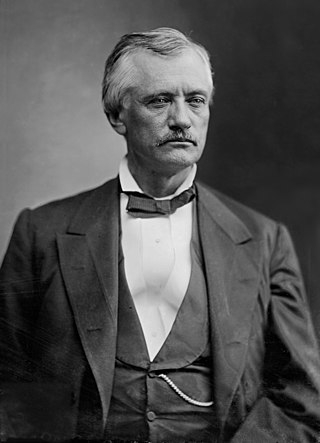
John Tyler Morgan was an American politician was served as a brigadier general in the Confederate States Army during the American Civil War and later was elected for six terms as the U.S. Senator (1877–1907) from the state of Alabama. A prominent slaveholder before the Civil War, he became the second Grand Dragon of the Ku Klux Klan in Alabama during the Reconstruction era. Morgan and fellow Klan member Edmund W. Pettus became the ringleaders of white supremacy in Alabama and did more than anyone else in the state to overthrow Reconstruction efforts in the wake of the Civil War. When President Ulysses S. Grant dispatched U.S. Attorney General Amos Akerman to prosecute the Klan under the Enforcement Acts, Morgan was arrested and jailed.

John Hollis Bankhead was a Democratic U.S. Senator from the state of Alabama between 1907 and 1920.
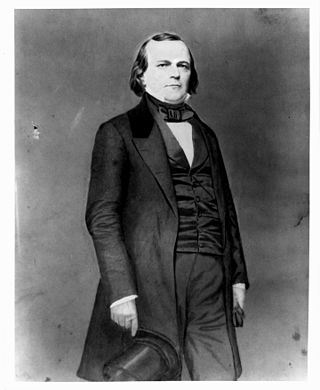
John Jones McRae was an American politician in Mississippi. A Democrat, he served in the Mississippi House of Representatives, the U.S. Senate, and as governor of Mississippi.
In American history, the Fire-Eaters were a group of pro-slavery Democrats in the Antebellum South who urged the separation of Southern states into a new nation, which became the Confederate States of America. The dean of the group was Robert Rhett of South Carolina. Some sought to revive America's participation in the Atlantic slave trade, which had been illegal since 1808.

John Jones Pettus was an American politician and lawyer who served as the 23rd Governor of Mississippi, from 1859 to 1863. Before being elected in his own right to full gubernatorial terms in 1859 and 1861, he served as acting governor from January 5 to 10, 1854, following the resignation of Henry S. Foote. A member of the Democratic Party, Pettus had previously been a Mississippi state representative, a member and president of the Mississippi State Senate. He strongly supported Mississippi's declared secession from the United States in 1861 and sought cooperation with the Confederate States of America.

Augustus Emmet Maxwell was an American lawyer and politician. Maxwell served in a number of political positions in the State of Florida including as one of Florida's Senators to the Confederate States Congress, Florida Secretary of State, and as Chief Justice of the Florida Supreme Court.
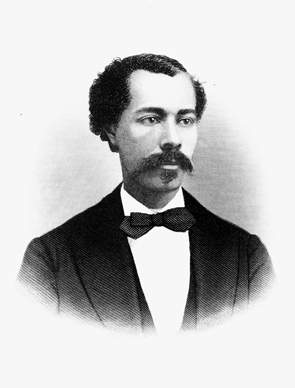
John Roy Lynch was an American writer, attorney, military officer, author, and Republican politician who served as Speaker of the Mississippi House of Representatives and represented Mississippi in the United States House of Representatives.
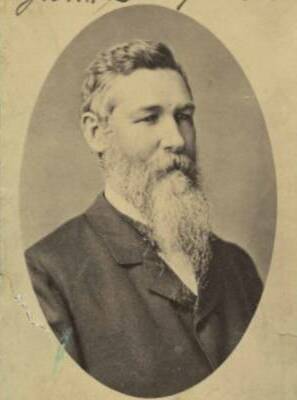
Josiah Abigail Patterson Campbell was an American politician and lawyer who served as the Chief Justice of the Supreme Court of Mississippi, and was previously a Speaker of the Mississippi House of Representatives and Deputy from Mississippi to the Provisional Congress of the Confederate States from 1861 to 1862.

During the American Civil War, Arkansas was a Confederate state, though it had initially voted to remain in the Union. Following the capture of Fort Sumter in April 1861, Abraham Lincoln called for troops from every Union state to put down the rebellion, and Arkansas and several other states seceded. For the rest of the civil war, Arkansas played a major role in controlling the Mississippi River, a major waterway.
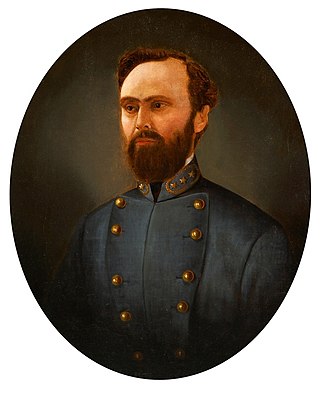
Jacob Hunter Sharp was a Mississippi lawyer, newspaperman and politician, as well as a general in the Confederate States Army during the American Civil War. He played a prominent role of several major engagements of the Army of Tennessee in the Western Theater, including the Atlanta Campaign in 1864 where he was several times recognized by his commanders and peers for bravery in combat. After the war, he also served in the Mississippi House of Representatives and was its Speaker from 1886 to 1888.
Philip Anthony Gunn is an American politician from the U.S. state of Mississippi. A member of the Republican Party, Gunn is the Speaker of the Mississippi House of Representatives, and represents the 56th district. He has served in the Mississippi House since 2004, and became Speaker in 2012. Gunn is the first Republican to serve as Speaker of the Mississippi House since 1876.
Moses Jackson was a Confederate Army officer during the Civil War and a state legislator in Mississippi. He was accused of being a ringleader of violent Democratic Party election activities He served in the state legislature immediately prior to the Civil War, after it, and again after Reconstruction ended. He served in the state house and as a state senator for Wilkinson County, Mississippi.
Freeman E. Franklin was a state legislator in Mississippi. He served as Speaker of the Mississippi House of Representatives in 1870.
Lock E. Houston was a judge and state legislator in Mississippi. He served as Speaker of the Mississippi House of Representatives. He served in the Mississippi House during the American Civil War.
References
- ↑ "Founders and Builders of Greensboro, 1808-1908: Fifty Sketches". J.J. Stone & Company. August 30, 1925 – via Google Books.
- ↑ Hill, University of North Carolina at Chapel (August 30, 1889). "Sketches of the History of the University of North Carolina: Together with a Catalogue of Officers and Students, 1789-1889". University – via Google Books.
- ↑ Battle, Kemp Plummer (August 30, 1907). "From its beginning to the death of President Swain, 1789-1868". author – via Google Books.
- ↑ Wheeler, John Hill (August 30, 1884). "Reminiscences and Memoirs of North Carolina and Eminent North Carolinians". Columbus print. works – via Google Books.
- ↑ Smith, Timothy B. (April 8, 2010). Mississippi in the Civil War: The Home Front. Univ. Press of Mississippi. ISBN 9781626744387 – via Google Books.
- ↑ Wakelyn, Jon L. (August 30, 2002). Confederates Against the Confederacy: Essays on Leadership and Loyalty. Greenwood Publishing Group. ISBN 9780275973643 – via Google Books.
- ↑ "Letter from J. P. Scales to Mississippi Governor John J. Pettus; November 25, 1862 · Civil War and Reconstruction Governors of Mississippi · Civil War and Reconstruction Governors of Mississippi". cwrgm.org.
- ↑ "mdah_757-943-03-16". collections.msdiglib.org.
- ↑ Representatives, Mississippi Legislature House of (August 30, 1859). "Journal" – via Google Books.
- This draft is in progress as of May 12, 2023.
